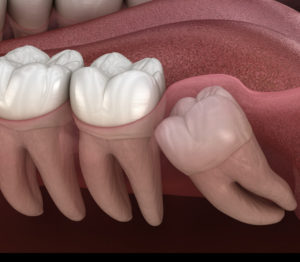Common Wisdom Teeth Removal Complications

The final set of teeth that erupts when people are in their late teens or early twenties is the wisdom teeth. These final sets of molars appear quite late or when a person is mature and thus the name “wisdom” teeth. Mostly they have ample and correct spaces to erupt and they emerge without any issues. But sometimes there is a lack of space in the mouth for these sets of teeth and then the teeth that emerge are placed or misaligned/crooked.
With this comes other dental complications that can severely affect the health of the neighbouring teeth. The oral health of the person is compromised and it becomes prone to other dental diseases as well. When there is a pain in the mouth or if one is concerned about the position of the wisdom teeth, then it is best to check with the dentist. The dentist will take an X ray and this can give a clear picture as to the alignment of the wisdom teeth and also if it will bring in any dental complications. Depending on the issue and condition of the oral health of the person, correct treatment procedures are planned. In most cases, dentists will suggest removal of the wisdom teeth to set right the problem. After the wisdom teeth removal, certain issues must be checked to ensure that the healing is progressing correctly.
Dry socket
Alveolar osteitis/dry socket is the condition that sets in when healing does not happen properly. After the teeth removal surgery is done, a blood clot is formed at the site of the surgery, this helps with faster healing. But in some cases, the clot does not form properly or is disturbed after formation. The healing process gets affected by this situation. The nerve that is beneath the clot gets exposed to food particles or even air. This condition usually happens when one is not careful after the surgery. The clot can get dislodged by smoking, or using a straw while consuming food. This will unbalance the clot that is formed and it can develop into the dry socket condition. Pain and discomfort accompany this condition. Immediately checking with the dentist when this situation arises is important.
Bleeding
Bleeding after surgery is common and nothing to be worried about. But if there is excessive bleeding and there are blood clots found in the mouth after the surgery – this requires an instant check by the dentist. Bleeding will stop within 24 hours after the process, and during this time one should be careful and follow the do’s and don’ts religiously. Excessive pressure in the mouth especially in the area of the surgery can force more bleeding. This can happen due to smoking or eating food and the area of the surgery gets pressured. Soft food is suggested by dentists during this time. This reduces the pressure in the mouth while chewing the food and the area of the surgery does not move much. This will help to reduce the bleeding and promote faster healing.
Pain
After any surgery feeling pain is normal. After removal of wisdom tooth removal, pain is bound to be felt for around 2-3 days after surgery. Dentists will prescribe pain killers or recommend taking over- the- counter medicines to reduce the pain. But in some cases, the pain does not go away after few days, it continues or even escalates. This can be due to an infection, dry socket or any other complication at the site of surgery. When this happens, immediate help must be sought from the dentist. Pain usually is the first symptom that comes out when there is a problem or even healing is not going as normal. It is important that when there is continuous pain, it be checked and the proper treatment sought.
Inflammation
Swelling is seen after the wisdom teeth removal. This is expected as surgery has been done. One can also find small inflammation in the cheeks and neck region. Care can be taken to reduce the swelling and also prevent it from increasing. Keeping your head in a raised space and reducing head and neck movements will help in reducing the swelling. Applying a cold pack to the cheeks and neck will bring relief to the swelling and reduce it faster. Pain and swelling will reduce in a few days and disappear altogether when the healing progresses.
Infection
There is a danger of infection after every surgery. This can be reduced if one takes precautions and reduces the chances of infection. Infection occurs when the surgery site is not clean. Bacterial action takes place and infection sets in easily as the area has been under a recent process. Cleaning the mouth after each meal, taking care that there is no food debris left in the mouth will help to fight infection. Reducing the irritation or activity to the surgery site can also help stop infection. When that area is not moved or irritated then the healing process happens at a faster pace. Dentists usually provide antibiotics to fight any infection after the surgery along with pain killers. These medicines will also help to stop any possible infections.
Numbness
The wisdom tooth removal surgery is a complex one and it is often conducted under anaesthesia. The dentist will inject the anaesthesia and the process begins after the numbness sets in. The numbness that sets in when before the procedure might sometimes continue even after the process is complete. The surgical area will regain its normal nature after the effect wears off. Sometimes the lips can also become numb. The wisdom tooth is quite near the nerve in the jaw line and this might be reason the for the numbness. But complications and damages to the nerve and numbness not wearing off are rare and are not seen at all. But after the surgery if the numbness does not go off, then it is getting advice from the dentist would be the best.
